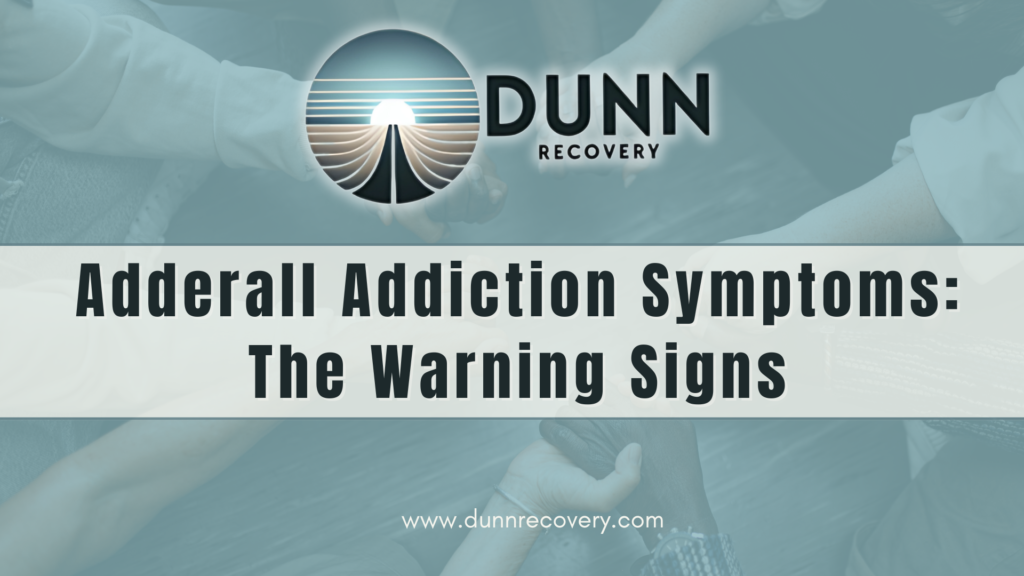When prescription medication turns from helpful to harmful, the consequences can be devastating. At Dunn Recovery, we recognize that Adderall, while beneficial for many individuals with ADHD or narcolepsy, nevertheless carries significant risks when misused. Understanding adderall addiction symptoms is therefore crucial for early intervention and successful recovery.
Indeed, the line between therapeutic use and dependency can blur quickly, leaving many to wonder, “am I addicted to adderall?” This comprehensive guide consequently explores the telltale signs of Adderall addiction, offering insight for those concerned about themselves or loved ones.
Adderall Addiction Symptoms: Understanding the Basics
Adderall, a prescription stimulant containing amphetamine and dextroamphetamine, effectively treats attention deficit hyperactivity disorder (ADHD) and narcolepsy when used as prescribed. However, its stimulant properties and accessibility unfortunately make it vulnerable to misuse.
The journey from prescribed use to addiction often begins innocently. Many users initially experience enhanced focus, productivity, and energy—benefits that can subsequently become psychologically addictive. Students pulling all-nighters, professionals meeting deadlines, or individuals seeking weight loss might therefore turn to Adderall without recognizing the risks.
At Dunn Recovery, our experienced team regularly observes how Adderall’s dopamine-boosting effects create powerful reward pathways in the brain. These pathways can thus lead to dependency if not carefully monitored.
How Adderall Addiction Symptoms Develop
Adderall addiction typically progresses through several stages:
- Initial use – Often begins with a legitimate prescription or experimentation
- Tolerance – The body adapts, consequently requiring higher doses for the same effect
- Dependence – Brain chemistry changes, thereby making normal functioning difficult without the drug
- Addiction – Compulsive use despite negative consequences
The transition from occasional use to addiction can happen gradually or rapidly, depending on individual factors including genetics, mental health history, and environmental stressors.
Risk Factors for Developing Adderall Addiction Symptoms
Certain factors increase vulnerability to Adderall addiction:
- History of substance abuse or addiction
- Mental health conditions including depression or anxiety
- High-pressure environments (competitive academic or work settings)
- Family history of addiction
- Young age when beginning use
- Method of consumption (crushing and snorting increases addiction risk)
Understanding these risk factors helps Dunn Recovery develop personalized treatment approaches for each client’s unique situation.
Signs of Adderall Addiction: Behavioral Indicators
Adderall addiction behavior changes often manifest before physical symptoms become apparent. Being able to recognize these subtle shifts in behavior could therefore be crucial for early intervention.
Changes in Priorities and Activities
When addiction takes hold, individuals frequently:
- Abandon previously enjoyed activities or hobbies
- Withdraw from social relationships and family obligations
- Focus obsessively on obtaining and using Adderall
- Experience academic or professional decline despite initial performance boosts
- Make repeated excuses for unusual behavior
Social and Relationship Changes from Adderall Dependency
The Dunn Recovery team regularly witnesses how Adderall addiction strains relationships. Common signs include:
- Increased secrecy about activities and whereabouts
- Defensiveness when questioned about medication use
- Borrowing or stealing money to purchase Adderall
- Declining interest in maintaining relationships
- Spending time with new friends who also use stimulants
Psychological and Emotional Signs
Adderall abuse signs often include notable mood and cognitive changes:
- Increased irritability and agitation when the medication wears off
- Anxiety and panic attacks that weren’t previously present
- Euphoria followed by crashes of depression or lethargy
- Paranoia or suspiciousness that seems out of character
- Racing thoughts or pressured speech
- Difficulty concentrating without the medication
One client at Dunn Recovery described her experience: “I started taking Adderall to keep up with my nursing program. Soon after, I couldn’t study without it. My friends said I became a different person—jumpy, paranoid, and always on edge.”

Physical Signs of Adderall Addiction
Physical signs of adderall addiction can range from subtle to severe. Our medical team at Dunn Recovery is thoroughly trained to recognize these indicators during assessment.
Observable Physical Symptoms of Adderall Addiction
Common physical manifestations include:
- Significant weight loss due to decreased appetite
- Dilated pupils and rapid eye movements
- Unusual energy levels alternating with extreme fatigue
- Changes in personal hygiene and appearance
- Frequent nosebleeds (if snorting the medication)
- Dry mouth and dental problems
- Skin picking or other repetitive behaviors
Internal Physical Symptoms of Adderall Abuse
Though less visible, these symptoms nonetheless signal serious health concerns:
- Increased heart rate and blood pressure
- Irregular heartbeat or palpitations
- Digestive issues including constipation or diarrhea
- Sleep disturbances – insomnia during use, excessive sleep during withdrawal
- Headaches and muscle tension
- Reduced immune function leading to frequent illness
Tolerance and Withdrawal Symptoms
Adderall dependency symptoms frequently include tolerance and withdrawal:
- Needing higher doses to achieve the same effect
- Using more than prescribed or running out of prescriptions early
- “Doctor shopping” to obtain multiple prescriptions
- Extreme fatigue when not using
- Increased appetite during withdrawal
- Strong cravings for the medication
- Inability to feel pleasure (anhedonia) without Adderall
Adderall Withdrawal: What to Expect
When someone develops dependency, ceasing use inevitably triggers withdrawal symptoms that can be physically and psychologically challenging.
Common Adderall Withdrawal Symptoms
The intensity of withdrawal varies based on usage patterns, but typically includes:
- Extreme fatigue and increased sleep
- Strong drug cravings
- Depression and anxiety
- Irritability and mood swings
- Increased appetite
- Vivid, unpleasant dreams
- Difficulty concentrating
- Physical discomfort including aches and pains
At Dunn Recovery, we provide medical supervision during withdrawal to ensure safety and comfort. Our team understands that this phase, while temporary, certainly requires compassionate support and sometimes medication to manage symptoms.
Timeline of Withdrawal
Adderall withdrawal typically follows this pattern:
First 1-3 days:
- Crash phase with fatigue, increased hunger, and mood changes
Days 4-7:
- Peak withdrawal symptoms including depression, irritability, and cravings
Weeks 2-4:
- Gradual improvement in symptoms, although fatigue and mood issues may persist
Beyond one month:
- Psychological symptoms may continue, especially for heavy or long-term users
Adderall Addiction in Adults: Special Considerations
Adderall addiction in adults presents unique challenges and symptoms compared to adolescents or young adults.
Professional Impacts of Adderall Addiction Symptoms
Adults with Adderall addiction often experience:
- Declining work performance despite initial productivity boosts
- Financial difficulties from purchasing pills illegally
- Frequent sick days during withdrawal or crashes
- Poor decision-making affecting career trajectory
- Interpersonal conflicts with colleagues
Relationship and Family Challenges
The ripple effects of addiction furthermore extend to personal relationships:
- Marital or partnership strain due to behavioral changes
- Parenting difficulties and inconsistent care for children
- Social isolation and withdrawal from family activities
- Financial stress on the household
- Trust issues stemming from secretive behavior
One Dunn Recovery client shared: “I started taking Adderall after my doctor prescribed it for adult ADHD. Within six months, I was taking triple my prescribed dose. My marriage was falling apart because I was either hyper-focused on work or completely crashed, with nothing left for my family.”
Adderall Addiction in College Students: A Growing Concern
Adderall addiction in college students has reached alarming levels on campuses nationwide. The pressure to excel academically, combined with misinformation about the drug’s safety, consequently creates a perfect storm for misuse.
Campus Culture and Accessibility
Several factors contribute to high rates of Adderall misuse on college campuses:
- Widespread availability through peers with prescriptions
- Perception as a “study drug” rather than a controlled substance
- Academic pressure and competitive environments
- Normalized use within certain campus communities
- Dual use with alcohol at parties, thereby creating dangerous interactions
Warning Signs in Students
Parents and friends should therefore watch for:
- Dramatic academic performance fluctuations
- Extreme study binges followed by periods of excessive sleep
- Weight loss and poor nutritional habits
- Financial problems without clear explanation
- Decreased interest in social activities that don’t involve substance use
- Changes in friend groups or secretive behavior
At Dunn Recovery, we work closely with many young adults struggling with Adderall addiction that began during college. Early intervention is thus crucial for preventing long-term impacts on brain development and future substance use patterns.
Long-term Effects of Adderall Addiction
The consequences of prolonged Adderall misuse can be severe and sometimes permanent. Understanding these risks subsequently motivates many to seek treatment at Dunn Recovery.
Cardiovascular Concerns
Long-term stimulant abuse can lead to:
- Permanent heart damage
- Increased risk of heart attack or stroke
- Chronic hypertension
- Heart rhythm abnormalities
Neurological Impacts
The brain’s structure and function can be altered by prolonged Adderall use:
- Dopamine system dysfunction
- Cognitive impairments affecting memory and executive function
- Increased risk of Parkinson’s disease
- Movement disorders similar to tics
- Seizures in severe cases
Psychological Consequences
Mental health often suffers significant damage:
- Chronic anxiety disorders
- Major depression when not using
- Psychosis with hallucinations or delusions
- Sleep disorders that persist after cessation
- Increased risk of developing other addictions
Social and Professional Fallout
The life consequences can be equally devastating:
- Damaged relationships with family and friends
- Career setbacks or job loss
- Financial difficulties
- Legal problems from illegal acquisition
- Educational underachievement despite initial performance enhancement

Adderall Addiction Treatment: Finding the Path to Recovery
At Dunn Recovery, we offer comprehensive, evidence-based approaches to treating Adderall addiction. Recovery is definitely possible with the right support and treatment plan.
Medical Detoxification
The initial phase focuses on safely managing withdrawal:
- 24/7 medical supervision to monitor vital signs
- Comfort medications to address specific symptoms
- Nutritional support to restore physical health
- Gradual tapering when appropriate
- Treatment of co-occurring conditions
Therapeutic Approaches
Evidence-based therapies form the core of effective treatment:
- Cognitive Behavioral Therapy (CBT) to address thought patterns
- Motivational Enhancement Therapy to strengthen recovery commitment
- Group therapy for peer support and shared experience
- Family therapy to heal relationships and build support systems
- Mindfulness practices to develop healthier coping skills
Aftercare Planning
Recovery continues long after formal treatment ends:
- Ongoing therapy and support groups
- Medication management for underlying conditions like ADHD or depression
- Life skills development for stress management
- Academic or vocational support
- Relapse prevention strategies
A Dunn Recovery alumnus shared: “After three years of Adderall addiction, I couldn’t imagine functioning without it. The therapists helped me understand how to manage my ADHD without stimulants. It wasn’t easy, but with their support, I eventually developed new strategies that actually work better for me in the long run.”
Am I Addicted to Adderall? Self-Assessment Questions
If you’re questioning your relationship with Adderall, consider these self-reflection questions:
- Do you take more Adderall than prescribed or take it without a prescription?
- Have you tried to cut down or stop but found you couldn’t?
- Do you spend significant time obtaining, using, or recovering from Adderall?
- Do you experience strong cravings that distract from other activities?
- Has your use interfered with work, school, or relationships?
- Do you continue using despite negative consequences to your health or life?
- Have you developed tolerance (needing more for the same effect)?
- Do you experience withdrawal symptoms when you don’t take it?
Answering “yes” to several questions suggests a potential addiction. At Dunn Recovery, we therefore offer confidential assessments to help determine the appropriate level of care.
When and How to Seek Help for Adderall Addiction Symptoms
Recognizing when to seek professional guidance is crucial. Consider reaching out to Dunn Recovery when:
- You or a loved one exhibits multiple symptoms mentioned above
- Attempts to stop or cut back have been unsuccessful
- Usage has increased beyond prescribed amounts
- Mental health symptoms are worsening
- Physical health concerns have emerged
- Daily functioning is impaired without the medication
Our compassionate team understands the courage it takes to ask for help. We accordingly provide:
- Confidential consultations to discuss concerns
- Comprehensive assessments to determine appropriate treatment
- Personalized treatment planning based on individual needs
- Family support resources to help loved ones
- Insurance verification and financial guidance
FAQ About Adderall Addiction Symptoms
Q1: How quickly can someone develop an addiction to Adderall? A: While individual experiences vary, dependency can develop in as little as a few weeks of regular use, especially with higher-than-prescribed doses. Adderall addiction symptoms may consequently appear gradually, making them easy to overlook initially.
Q2: Can you become addicted even with a prescription? A: Yes, even those with legitimate prescriptions can develop signs of adderall addiction if the medication is taken in higher doses, more frequently, or for longer periods than prescribed.
Q3: What’s the difference between physical dependency and addiction? A: Physical dependency means your body has adapted to the drug and experiences withdrawal without it. Addiction includes dependency plus compulsive drug-seeking behavior despite negative consequences. Both are therefore components of adderall dependency symptoms.
Q4: Are there any physical signs that doctors can test for? A: While there’s no single test for addiction, doctors may observe physical signs of adderall addiction like elevated heart rate, high blood pressure, weight loss, and dilated pupils. Blood or urine tests can confirm recent use but don’t diagnose addiction.
Q5: How does Adderall addiction affect sleep? A: Adderall typically causes insomnia during active use, followed by excessive sleep during withdrawal. Long-term use can permanently disrupt normal sleep architecture, a common complaint among those experiencing adderall addiction symptoms.
Q6: Can Adderall addiction cause permanent damage? A: Yes, prolonged misuse can cause lasting cardiovascular damage, cognitive impairments, and mental health issues. However, many effects improve with sustained recovery and proper treatment.
Q7: How is Adderall addiction treated if someone has legitimate ADHD? A: Treatment focuses on alternative ADHD management strategies, including non-stimulant medications, behavioral therapies, and lifestyle modifications. At Dunn Recovery, we specifically specialize in treating co-occurring ADHD and adderall addiction in adults.
Q8: What are the most common behavioral signs of Adderall abuse? A: Common adderall abuse signs include social withdrawal, secretive behavior, dramatic mood swings, declining performance at work or school despite initial improvement, financial problems, and doctor shopping to obtain multiple prescriptions.
Q9: How does Adderall addiction differ between adults and adolescents? A: Adderall addiction in college students often manifests as academic performance fluctuations, while adderall addiction in adults may present more prominently in workplace issues and relationship problems. Adolescents may therefore show more obvious behavioral changes.
Q10: Can someone recover from Adderall addiction without professional help? A: While some individuals manage to stop independently, professional treatment significantly increases success rates, especially for those with severe addiction, concurrent mental health issues, or previous relapse. Treatment addresses not just the physical dependency but also the underlying factors contributing to addiction.
Conclusion: Finding Hope in Recovery
Identifying adderall addiction symptoms is the crucial first step toward healing. At Dunn Recovery, we’ve witnessed countless individuals transform their lives after stimulant addiction, subsequently rebuilding relationships, careers, and health with the right support.
Recovery isn’t merely about abstaining from Adderall—it’s about developing healthier coping mechanisms, addressing underlying issues, and creating a fulfilling life free from dependency. Our evidence-based treatments therefore provide the foundation for lasting recovery.
If you recognize signs of adderall addiction in yourself or someone you care about, know that compassionate, effective help is available. The path to recovery begins with a single step: reaching out. Dunn Recovery’s experienced team is consequently ready to guide you through every stage of this journey, from initial assessment through long-term recovery support.
In conclusion, don’t let Adderall continue controlling your life. Contact Dunn Recovery today to learn how our comprehensive treatment programs can help you reclaim your health, relationships, and future.

